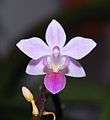Phalaenopsis equestris
Phalaenopsis equestris is a flowering plant of the orchid genus Phalaenopsis and native to Philippines and Taiwan. The inflorescence has 10 to 20 flowers of about 25 mm (1 in) diameter.[1]
| Phalaenopsis equestris | |
|---|---|
 | |
| Scientific classification | |
| Kingdom: | |
| (unranked): | |
| (unranked): | |
| Order: | |
| Family: | |
| Subfamily: | |
| Genus: | |
| Subgenus: | |
| Species: | P. equestris |
| Binomial name | |
| Phalaenopsis equestris | |
| Synonyms | |
Phaleonopsis equestris plays an important role in the development of novelty species and it is frequently used to cross with other hybrids. It has become an important commodity in the international floral trade.
This species is highly variable in morphology as well in the color of its flowers. The following forms occur :[2]
- Phalaenopsis equestris var. alba — a pure white form; lacking yellow pigments on the callus.
- Phalaenopsis equestris var. aurea — white flowers with a solid yellow lip.
- Phalaenopsis equestris var. rosea— flowers with even red petals and sepals; color of the mid-lobe of the lip varies from deep red to light red.
- Phalaenopsis equestris var. leucaspis — small flowers with white edges on pink petals and sepals; mid-lobe of the lip is purple or orange in color with white or yellow callus.
The different colors on the lip are obtained through a different expression of both anthocyanins and carotenoids.[3]
 Phalaenopsis equestris var. aurea
Phalaenopsis equestris var. aurea Phalaenopsis equestris var. leucaspis
Phalaenopsis equestris var. leucaspis
References
- "Botanica. The Illustrated AZ of over 10000 garden plants and how to cultivate them", p. 658-659. Könemann, 2004. ISBN 3-8331-1253-0
- Ching-Yan Tang† and Wen-Huei Chen, "Breeding an development of new varietiesd in Phalaenopsis" Orchid biotechnology. World Scientific, Singapore, 2007
- Fu YM, Chen WH, Tsai WT, et al. (1996). "Studies on floral color heredity of Phalaenopsis equestris". Report of the Taiwan Sugar Research Institute. 152: 35–49.
External links


This article is issued from Wikipedia. The text is licensed under Creative Commons - Attribution - Sharealike. Additional terms may apply for the media files.